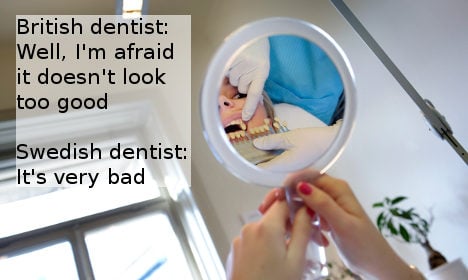I like the refreshing honesty of Swedish medical professionals.
If a dentist, back in the UK, had just looked at a disappointing set of x-rays then I can guarantee that he or she would have started the coming conversation about the results something like this:
“Well, I'm afraid that it doesn't look too good.”
That's reassuring. You get the cheerful and conversational “well”, you get the buffer phrase “I'm afraid” that sets you up to hear something not quite so cheerful, and then you get to the meat of the sentence: “doesn't look too good.” You know that it isn't really good news, but you hear the word “good”, and at some level that perks you up a bit. It might NOT be good, but at least it's on the “good” scale, and that's something to be positive about.
All-in-all, you've had some disappointing news, but you don't feel too despondent about it. Even the follow-up is quite positive:
“Still, we'll see what we can do.”
So, the sun is still shining, the birds are still singing, not all your teeth have fallen out, happy days.
Contrast this to what my Swedish dentist said today, looking at the x-rays:
“It's very bad.”
Short and brutal. No trying to disguise anything. No buffer phrases, no cheerful sounding words, we are on the “bad” scale for sure, so just deal with it.
“In fact, it's worse than I thought it would be.”
Sun blackens, birds choke, teeth wobble. Truth hurts.
Now, maybe it was my own fault for choosing to speak English with my dentist (I can't help it, even when I moved to Sweden I kept my English dentist for years, and my English dentist was actually Swedish, living in Brighton, and she was my dentist between the ages of 13 and 45 [me, not her, obviously]), so in my world all dentists are Swedish and you talk English with them, that's just the way life is – although I guess my Swedish dentist in Brighton had learned all the “polite” expressions), and maybe if we had spoken in Swedish it wouldn't have seemed so… hard. But it's interesting how this is one thing that comes up again and again with Swedes speaking English – it is just so difficult to master all the overly polite and flowery language, it just doesn't really exist in Swedish to the same extent as it does in British English.
We have so many of these buffer phrases – “I'm afraid”, “Unfortunately”, “Regretfully”, “It seems”, “I'm sorry, but” – that just don't come easy to Swedish lips. And then in English, even though we aren't really aware that we're doing it, we often give bad news in a positive way – “It wasn't very exciting” (“it was boring”), “It didn't taste very nice” (“tasted like poodle sweat and ostrich droppings”), “They weren't very welcoming” (“they laughed in my face, kicked my cat and tipped custard down my trousers”). You can notice this at airports (not the custard down the trousers, although with Ryanair, it's probably just a matter of time), how a flight is never “late”, but always “delayed”. “Late” is on the “bad” scale, “delayed” is still, just about, on the “good” scale. There's still hope.
Another thing we do in English to try and be polite is to sometimes turn things into questions, so instead of saying “I think we should accept the offer” we might change it into “Don't you think we should accept the offer?” Make the other person think that their opinion counts, even if it doesn't and you're going to accept the offer and kick their cat anyway. In English we often fall over backwards to be extra polite and nice.
Not that there isn't a time for being short and brutal. If someone hasn't paid an invoice you can start out by sending an e-mail that says: “Sorry to bother you, but it seems that the April invoice is a little bit overdue. Do you think you could look into it for me? Many thanks!” but if it is November and you are still waiting then you are quite justified in writing: “You still haven't paid the April invoice. Sort it. Now. Or I'm coming with custard.”
It can be a tricky thing for non-native speakers to master, especially Swedes, but it is worth learning some of the common expressions and phrases that English speakers use to be polite. It might just save your cat from a brutal kicking one day.
Oh, and if you're wondering about my visit to the dentist, I have to have a tooth taken out. I am sure that in England the dentist would begin by saying “Now, this may just hurt a tiny bit”, but I have steeled myself for my dentist in Sweden to begin by saying “This is going to hurt you very much”. Happy days!
David Ashby, from Brighton, moved to Gothenburg in 2002. He is a certified English as a Foreign Language teacher who today teaches business English in Stockholm. Read more about him here.
Do you want to write a guest blog for The Local? Email us at [email protected].


 Please whitelist us to continue reading.
Please whitelist us to continue reading.